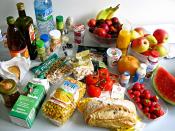Every day after school, Elizabeth I. Gay would run home. When she arrived there, she would eat ice cream, cookies, string cheese, anything that was around. She would then run immediately to the bathroom and make herself throw all of it up. When her mother came home, she would tell her that she had only eaten a piece of wheat bread and an apple all day long. Her mother would congratulate her and tell her, "That's the only way that you will never get fat."ÃÂ Everyone has their own story about mothers and food. The link between the two is, of course, elemental; every child's first eating habits come from the mother's body. We feed off our mothers, and then when they no longer make the food in their bodies, they cook it on the stove-oatmeal, macaroni and cheese, hot dogs, Spaghetti-O's.
(more) Fleischman P.2-mothers and daughters In the last generation, it seems that the script between mothers and daughters has changed when dealing with food.
It used to go something like this: Eat your vegetables. Finish your plate. No playing until your food is gone.
Now it sounds like this often: Do you really want to eat that? Too many of those will make you fat. You look like you might be putting on a few pounds; you'll have to be careful.
Sometimes the script is less revealed through words than through actions. Every night at dinner, Gay's overweight mother used a smaller plate than the rest of the family in an attempt to control her own eating. Gay soon developed anorexia nervosa and became emaciated, obsessed, and still "too fat."ÃÂ Mothers have always held a powerful hold on their daughters' ideas about food, eating and body shape. Feeding their children has been their duty for most of...


